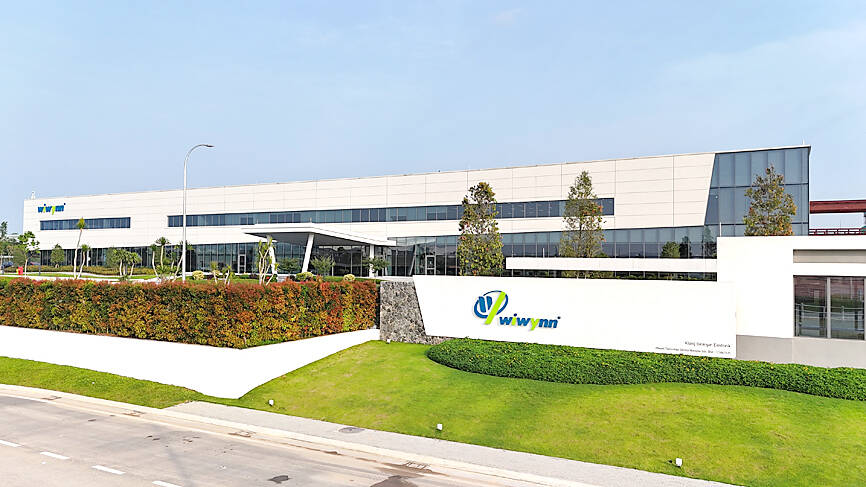Wiwynn Corp (緯穎科技) is to continue capacity expansion to meet market demand, the maker of cloud-based servers and hyperscale data centers said yesterday, adding that the growth momentum of artificial intelligence (AI) servers would remain strong next year.
The company’s non-current assets including factories account for 10 percent of total assets, indicating that Wiwynn has actively and continuously expanded its production capacity in recent years, chief financial officer Harry Chen (陳昌偉) told investors yesterday.
Chen said the company’s board of directors on Monday approved a plan to lease land on the Tainan campus of the Southern Taiwan Science Park and build a new factory there to produce server circuit boards and for testing and certifying new products including AI servers and cloud-based devices.

Photo courtesy of Wiwynn Corp
The construction cost is estimated at about NT$6.2 billion (US$192.6 million), he said.
The new investment comes as the company installed more production equipment at its existing factory in Tainan this month as market demand continues to rise, Wiwynn said.
The company started construction of its first factory in Malaysia in the third quarter of this year, mainly for systems integration services, it said. The second factory in Malaysia, primarily for the production of motherboards, is expected to begin production in the second half of next year, it added.
The company also plans to expand capacity at its factories in Mexico to enhance supply chain resilience, it said.
Wiwynn reported a net profit of NT$2.62 billion (US$81.4 million) in the July-to-September quarter, flat from the previous quarter but down 39.4 percent from NT$4.32 billion a year earlier, with earnings per share of NT$14.96.
Gross margin improved to 9.6 percent in the third quarter, compared with 8.8 percent in the previous quarter and 8.1 percent a year ago. Last quarter’s gross margin was the company’s best quarterly figure since its Taiwan Stock Exchange debut in late March 2019.
During the first three quarters of this year, net profit contracted 16.6 percent to NT$8.53 billion, from NT$10.22 billion a year ago, with earnings per share dropping to NT$48.78 from NT$58.48.
Third-quarter revenue dropped 33.7 percent year-on-year to NT$52.82 billion and cumulative revenue in the first three quarters fell 10.8 percent annually to NT$183.35 billion.
Chen said the annual decrease in revenue in the third quarter was not unexpected, but added that AI server revenue exceeded 10 percent of its total revenue in the quarter, meeting the company’s expectations.

With an approval rating of just two percent, Peruvian President Dina Boluarte might be the world’s most unpopular leader, according to pollsters. Protests greeted her rise to power 29 months ago, and have marked her entire term — joined by assorted scandals, investigations, controversies and a surge in gang violence. The 63-year-old is the target of a dozen probes, including for her alleged failure to declare gifts of luxury jewels and watches, a scandal inevitably dubbed “Rolexgate.” She is also under the microscope for a two-week undeclared absence for nose surgery — which she insists was medical, not cosmetic — and is

GROWING CONCERN: Some senior Trump administration officials opposed the UAE expansion over fears that another TSMC project could jeopardize its US investment Taiwan Semiconductor Manufacturing Co (TSMC, 台積電) is evaluating building an advanced production facility in the United Arab Emirates (UAE) and has discussed the possibility with officials in US President Donald Trump’s administration, people familiar with the matter said, in a potentially major bet on the Middle East that would only come to fruition with Washington’s approval. The company has had multiple meetings in the past few months with US Special Envoy to the Middle East Steve Witkoff and officials from MGX, an influential investment vehicle overseen by the UAE president’s brother, the people said. The conversations are a continuation of talks that

CAUTIOUS RECOVERY: While the manufacturing sector returned to growth amid the US-China trade truce, firms remain wary as uncertainty clouds the outlook, the CIER said The local manufacturing sector returned to expansion last month, as the official purchasing managers’ index (PMI) rose 2.1 points to 51.0, driven by a temporary easing in US-China trade tensions, the Chung-Hua Institution for Economic Research (CIER, 中華經濟研究院) said yesterday. The PMI gauges the health of the manufacturing industry, with readings above 50 indicating expansion and those below 50 signaling contraction. “Firms are not as pessimistic as they were in April, but they remain far from optimistic,” CIER president Lien Hsien-ming (連賢明) said at a news conference. The full impact of US tariff decisions is unlikely to become clear until later this month

Nintendo Co hopes to match the runaway success of the Switch when its leveled-up new console hits shelves on Thursday, with strong early sales expected despite the gadget’s high price. Featuring a bigger screen and more processing power, the Switch 2 is an upgrade to its predecessor, which has sold 152 million units since launching in 2017 — making it the third-best-selling video game console of all time. However, despite buzz among fans and robust demand for pre-orders, headwinds for Nintendo include uncertainty over US trade tariffs and whether enough people are willing to shell out. The Switch 2 “is priced relatively high”